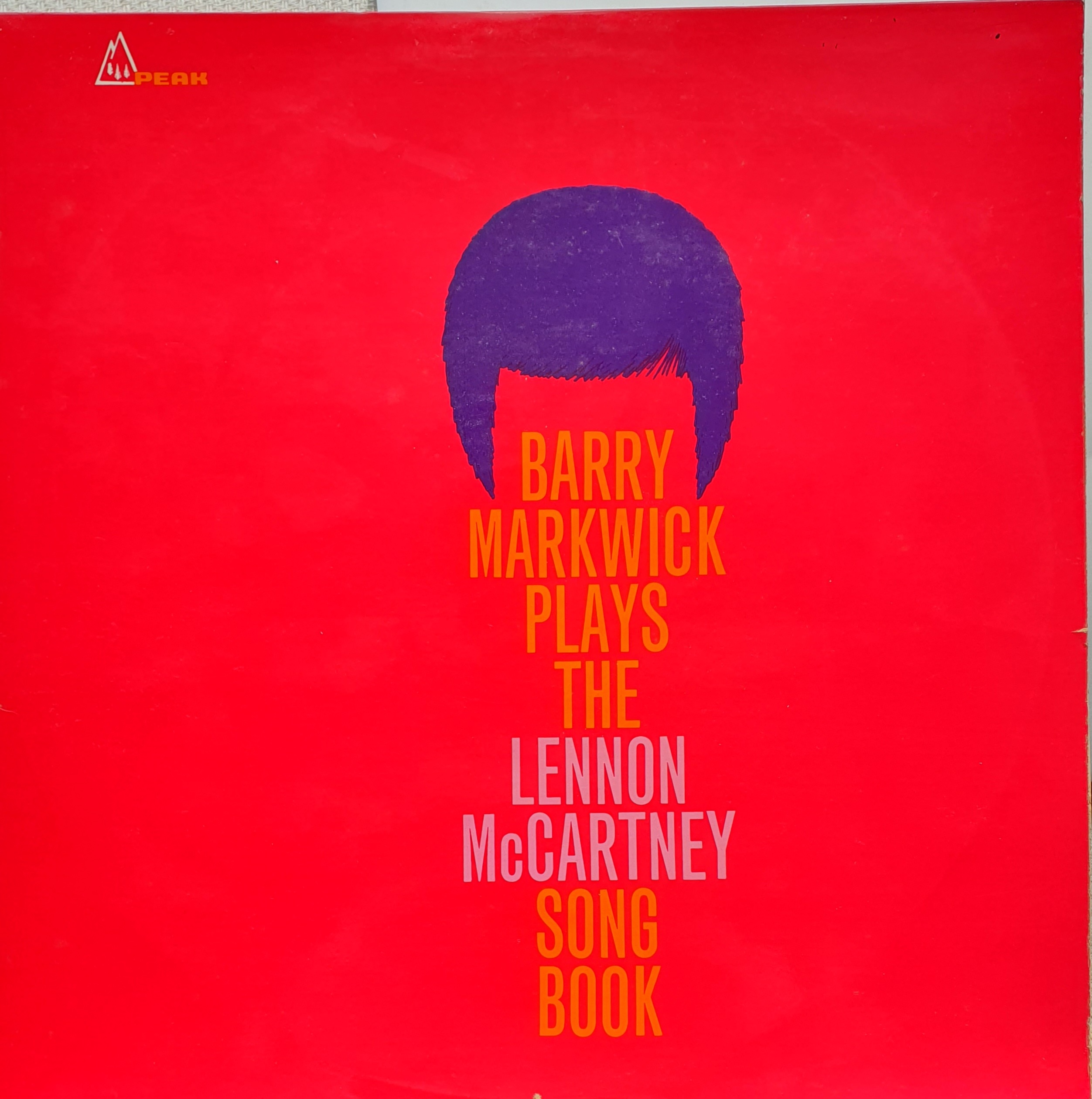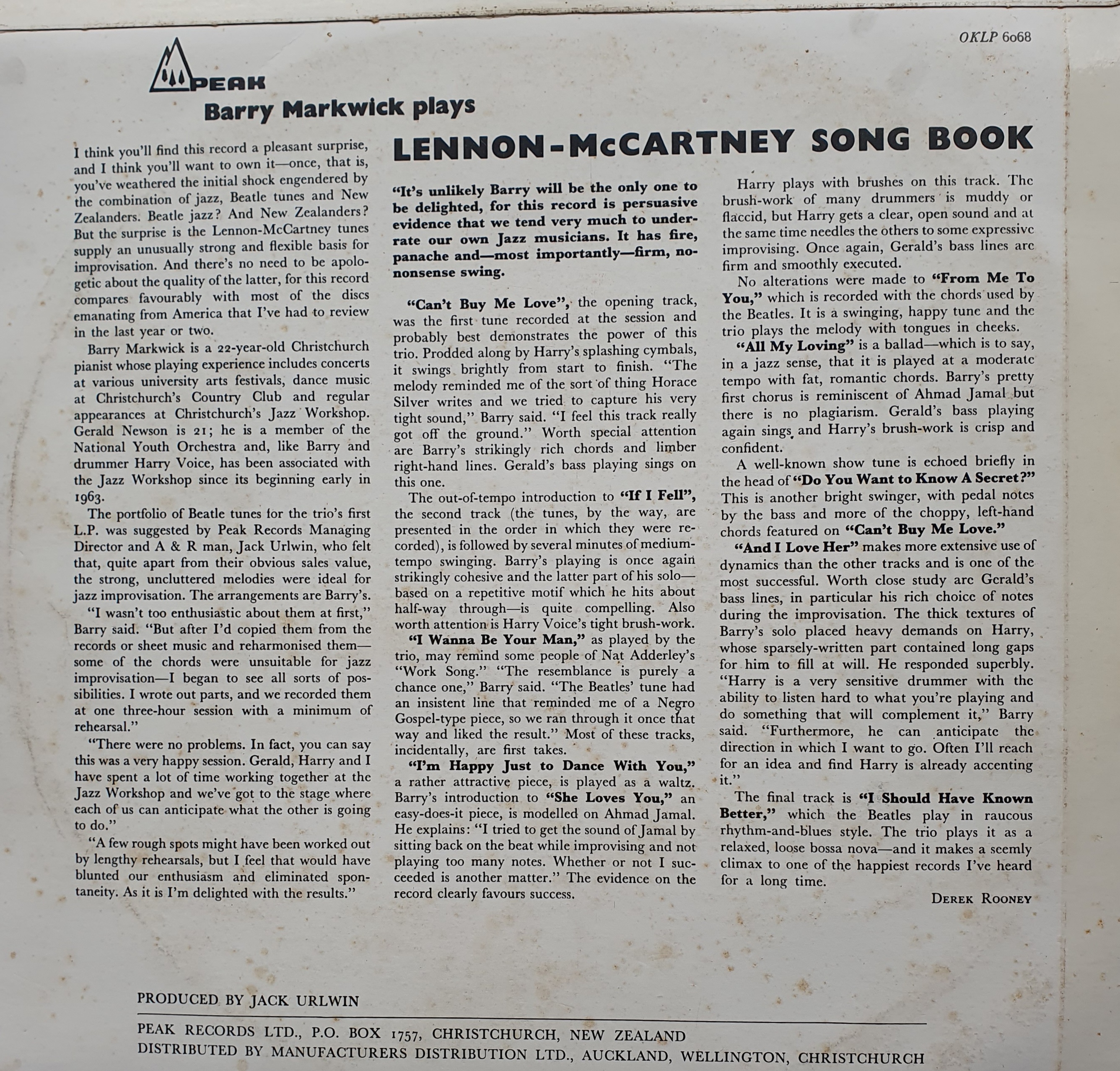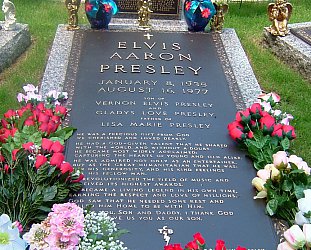Graham Reid | | 3 min read
Can't Buy Me Love
Few people know the backroads and by-ways of New Zealand music like Chris Bourke, the current editor of AudioCulture.
A former editor of Rip It Up '86-'88, he delivered the Crowded House biography Something So Strong and two remarkable books of historical research, the essential Blue Smoke; The Lost Dawn of New Zealand Popular Music 1918-1964 and Goodbye Maoriland; The Songs and Sounds of the Great War.
So when Bourke tells you he has found something he hadn't known about previously it is a major discovery, in this case an album by a 22-year old jazz pianist Barry Markwick from Christchurch who recorded an album in 1965.*
But it's not just that Markwick recorded at all, it's what he arranged and recorded: tunes by the Beatles.
The album Barry Markwick Plays The Lennon-McCartney Songbook on the Peak label (owned by Jack Urlwin) features 10 Beatle songs with 21-year old bassist Gerald Newson (later in the London Symphony Orchestra and the New Zealand Symphony Orchestra) and drummer Harry Voice (who had played in the NZ Jazz Quartet).
What is unusual about the trio album is how early it appeared: by the late Sixties a number of artists had covered Beatle songs, from Arthur Fielder and the Boston Pops Orchestra, Dizzy Gillespie and Count Basie to George Benson and Booker T and the MGs.
But their albums appeared in '69 and '70.
 It is hard to find any artists covering Beatle songs as early and so comprehensively as Markwick, and none we can find who were jazz musicians.
It is hard to find any artists covering Beatle songs as early and so comprehensively as Markwick, and none we can find who were jazz musicians.
Jazz players – many of whom were swept aside by Beatlemania and were therefore both resentful and dismissive of the Beatles' music – were very slow to hear the possibilities in the melodies.
By the Eighties people like Sarah Vaughan were all over Beatles' songs and the labels Verve, GRP and Blue Note (among others) have had Beatle tribute albums recorded by artists on their books: Diana Krall, Ramsey Lewis,Chick Corea, Cassandra Wilson, Herbie Hancock, Wes Montgomery, Lee Morgan . . .
But even just six years ago Quincy Jones was dismissive of the Beatles.
“They were the worst musicians in the world,” he told interviewer David Marchese. “They were no-playing motherfuckers. Paul [McCartney] was the worst bass player I ever heard.
“And Ringo? Don’t even talk about it.”
To be fair to Q, he was in a tetchy mood, was 84 and was talking about their playing abilities not the songwriting.
So whatever we make of young Barry Markwick we have to conceded he was way ahead of his time and peers with a jazz album of Lennon-McCartney tunes.
And is it any good?
Surprisingly so.
Can't Buy Me Love has the kind of cool swing of Ramsey Lewis, he tears through the ballad If I Fell after a faithful start, finds something worth exploring in the barely interesting tune of I Wanna Be Your Man and I'm Happy Just to Dance With You is a waltz.
If I Fell, by Barry Marwick
On the back cover Markwick acknowledges he tried “to get the sound of [Ahmad] Jamal by sitting back on the beat while improvising and not playing too many notes” on She Loves You.
Listen for the musical quote on Do You Want to Know a Secret, and if And I Love Her is a bit too close to the lounge bar then the bossa treatment of I Should Have Known Better which closes the album is just a bit of fun.
However you assess it – musical or historical – the album stands up.
We'd guess there aren't too many copies out there in the world so we thank Chris Bourke for not just bringing it to our attention but sending on the music and the cover art.
Beatle jazz from Christchurch in 1965?
Who knew?
And whatever happened to him? Our best efforts have turned up nothing so far.
And that's why we need to talk about Barry Markwick.
.
* Bourke tells Elsewhere that this was in fact the first of two albums of Beatle tunes by Barry Markwick who left the country for the United States. If anyone has a copy of either of these albums, or both, please get in touch with Elsewhere.
.
For other articles in the series of strange, sad or interesting characters in music, WE NEED TO TALK ABOUT . . . go here.
.








dom yates - Jun 26, 2023
Cool as cover art too
Savepost a comment